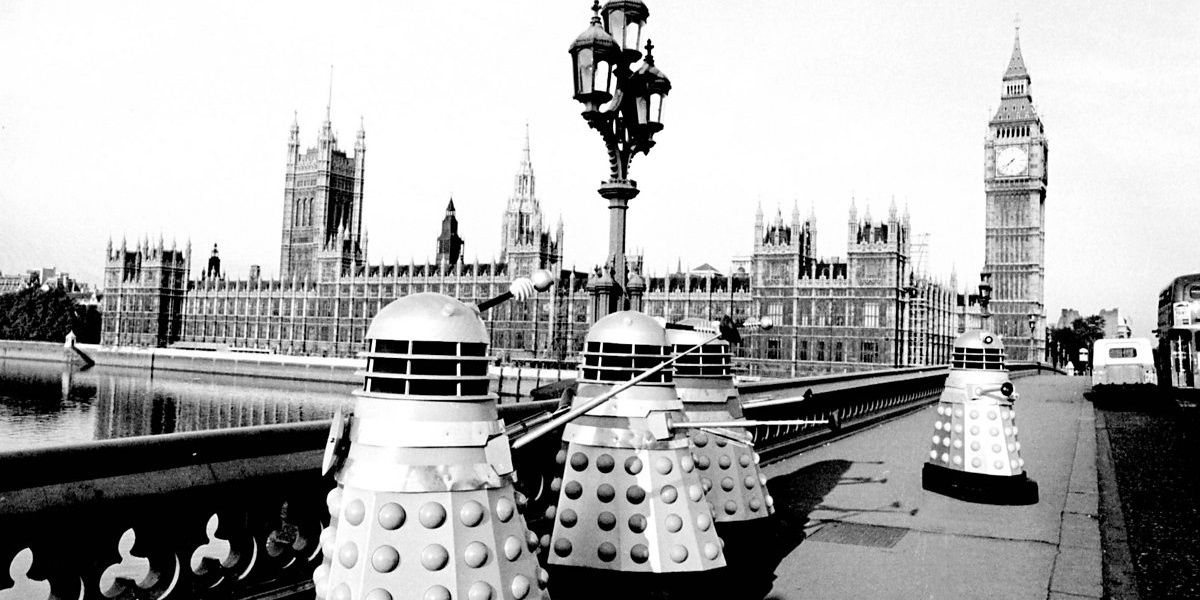Some TV show theme songs become platinum-selling hits, others stick in the popular culture for generations. Others still outlive the shows they were written for. One theme song broke new ground for television songwriting and remained a mainstay of TV and culture for decades.
Doctor Who first hit the airwaves in 1963, and after a significant hiatus, reemerged in 2005 as one of the most popular sci-fi series of all time. Through multiple showrunners, teams, and onscreen stars, the show has remained beloved by a massive and devoted fan base. At this point, the show is likely unkillable, so some elements of it could be a part of pop culture forever. Its music is one of those elements.
The Doctor Who theme song was written in 1963 by Australian composer Ron Grainer. Grainer is well known for a variety of TV show theme songs, including 1967's The Prisoner and 1979's Tales of the Unexpected. His work is award-winning and well-received. He composed theme music for shows of all kinds, from crime drama to sitcom to sprawling sci-fi epic. The track is officially titled "Doctor Who," but was recognized at the time as "Dr. Who." Since 1963, Doctor Who has used different arrangements of the same musical composition to open the program. The main melody has remained preserved for almost sixty years as one of the most recognizable pieces of music on television. Though there have now been dozens of arrangements of this piece, the original 1963 orchestration is a work of art that borders on sorcery.
The first presentation of the Doctor Who theme song, the one that played for the first seventeen years of the show, was created by Delia Derbyshire. Derbyshire is one of the most important and most underrated figures in the history of electronic music. Born in Coventry in 1937, Derbyshire had a knack for music from an early age. She studied mathematics at Cambridge in the fifties, but later changed her major, graduating in 1959 with a BA in music and math. She applied for a job at Decca Records in the early 60s, only to be rejected because the company did not employ women. She taught piano to kids from around the world, worked as an assistant for a key figure in radio, and eventually became a production assistant with noted publishers Boosey & Hawkes. She worked on the BBC-owned magazine Record Review, where she displayed a preternatural grasp of music engineering. That got her assigned to her dream position, the Radiophonic Workshop. While there, she worked on over 200 theme songs, including the 1963 work that would become the best-known piece of her catalog.
Synthesizers were not available to the public in 1963, so Derbyshire needed to use some pretty innovative techniques to create the Doctor Who opening theme. The track was created with extremely limited sounds, which were manipulated to create varied notes and melodies. A single plucked string forms the primary baseline of the track. Oscillators, which are typically used to calibrate recording equipment, make up the swooping melody. A keyboard hooked up to the same oscillator banks was used for the lower notes of the melody. Finally, the unusual hissing and bubbling sound effects come from filtered white noise recordings. The "musique concrete" techniques take extremely limited input and churn out unbelievable results through painstaking manipulation. Reportedly, when Grainer heard what Derbyshire had created with his score, he asked "Did I write that?", to which she replied "Most of it." Grainer fought for Derbyshire to get a co-composer credit, but the BBC shot the idea down, reportedly for anonymity.
The original theme required the invention of new techniques, like a rudimentary form of multitracking, which required several simultaneously operating tape machines. Each note was trimmed from a larger piece and stuck together, like assembling a short film reel one frame at a time. The sheer work involved boggles the mind. Some slight changes were made over the years, but this was the song that heralded in Doctor Who until 1980. Reportedly, Derbyshire despised any alterations made to her work and approved only of the two cuts she released. Both have been preserved with the utmost care, and the original cuts with edits added every inch remain today. Over the fifty-nine years since Derbyshire's original, there have been around a dozen reorganizations of the song, depending on what counts as a new version.
After creating the iconic TV theme song, Derbyshire went on to form the band White Noise, which is one of the most influential groups in the early days of electronica. She composed for Royal Shakespeare Company productions, Yoko Ono's short film, and the 1973 horror film The Legend of Hell House. Her work is crucial in the development of this genre of music, and she deserves a great deal more recognition. The Doctor Who theme song is a piece of music history, and is as just important to today's culture as the show it precedes.



